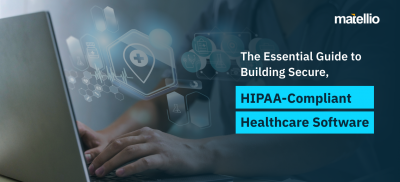
Are you a business analyst looking to optimize the value of your products with respect to their location? If yes, then you have stopped by the right place! But before you dive into learning all about location analytics software, one question might pop up in your mind: “Why go for custom development?” While there could be multiple answers to this, if you have already decided to go for a tailored location analytics software development, you’re likely seeking solutions that perfectly align with your unique business needs and objectives.
Indeed, off-the-shelf location analytics software helps converge geographical data with operational data. However, this convergence may not offer you specific features required to address your company’s particular challenges or opportunities.
Custom enterprise software development allows you to get your hands on precisely tailored solutions. Such a solution can give you a chance to uncover hidden patterns, gain a deeper understanding of customer behavior, and make location-informed decisions specifically as per your particular business requirements. In this comprehensive guide, we’ll explore the several use cases, applications, and steps involved in developing custom location analytics software development so that you can understand how to optimize your business operations with such a solution and unlock the full potential of your location-based data.
Location Analytics Software Market
Who Can Benefit from the Growing Location Analytics Market Size?
Whether you are the business owner of a data analysis firm wanting to extract geographical data for your potential clients in a customized manner or if you are planning to get such a solution for your location-intensive business, know that the market of location analytics software is lucrative. With cutting-edge location-based services and technological support, you can build a solution that serves your clients like no other product in the market, accelerating your business towards profitability and sustainability.
Factors Signifying Growth in Location Analytics Market Size
Propellers of Location Analytics Software Market
IoT
The widespread use of IoT devices brings in lots of real-time data with location tags. IoT-based location analytics software development is helping businesses understand better how customers behave. It also allows enterprises to comprehend operational dynamics and make data-driven decisions.
Artificial Intelligence and Machine Learning
When AI and ML work closely with location intelligence, they help predict things better. This means they can help with important tasks like expanding into new markets, reducing risks, and managing assets more accurately.
Cloud Deployment
Cloud infrastructures can handle a lot of geographic data for enterprises. They can then use this data to make smart decisions quickly. Cloud is easy to integrate, facilitating collaborative data sharing and reducing infrastructure costs.
Drive Efficiency and Growth with Location Analytics Software.
What is Location Analytics Software?
To learn what the software does, let’s first understand the phenomenon of location analytics. It’s basically digging into data but with a map in hand. Location analytics, or geoanalytics, involves integrating geographical data into a company’s data resources. It taps into information from network gadgets and smart building setups and focuses on Internet of Things (IoT) devices.
Now, when it comes to location analytics software, it’s like a handy tool, especially for big companies spread across different places, helping them get a visual grip on all that valuable data using mapping software. As per your business requirements, you can either have this software particularly made for your enterprise or seek a holistic IoT analytics solution with location analytics integration.
Whatever you choose, remember with the right vendor, the practice of relying on location-based analytics can take all sorts of info about assets, buildings, and roads and mix it up with details about how your business is doing and who’s buying what. It can help you spot any sneaky risks, like how a natural disaster might mess with operations or where fraudsters might be lurking. But it’s not just about dodging trouble; it also assists in sniffing out market trends, snooping on what competitors are up to, and finding new markets to conquer for several industry domains.
Industrial Use Cases of Location Analytics Software
Every business today wishes to have a bird’s eye view. Location analytics allows them to gain just that type of vision. And the best part? The practice is versatile enough to be used by almost every type of industry. Here’s how several sectors can take advantage of it-
 Retail and e-Commerce
Retail and e-Commerce
A location analytics solution for retailers can locate the best spots for stores, figure out where the crowds are, and even spy on how customers move around based on where they are. Online sellers are in on the game, too, using it to suggest products, figure out the fastest way to get stuff to customer’s doors, and hit them up with deals based on their location.
 Real Estate
Real Estate
If you’re in the property domain, location analytics software can prove to be a boon for you. You’d be peeking at property values, spotting trends in the market, and making smart choices about where to invest. It’s like having a geographic fortune teller that signifies which areas are going to be profitable for you.
 Logistics and Transportation
Logistics and Transportation
Companies in this logistics industry use location analytics to plan out the smoothest routes, keep their fleets in line, and make sure packages get where they’re going on time. The technique aids in cutting costs, saves time, and keeps things running like a well-oiled machine for this segment.
 Insurance
Insurance
Insurance agencies can use location analytics software to dodge business risks. With such capabilities, insurers can learn where accidents are likely to happen, which areas are prone to disasters, and how likely it is that you’ll need to cash in on that policy. For the insurance industry, location analytics are about crunching the numbers to set the right prices and keep everyone covered.
 Marketing and Advertising
Marketing and Advertising
Imagine ads that know exactly where your target customer is and what they like. That’s what’s happening here. Marketers use location data to target their pitches, figure out what makes different areas tick, and make sure their messages hit home with the right folks.
Do you Have Industry-Specific Requirements for Location Analytics?
 Healthcare
Healthcare
Although healthcare is not so location-intensive domain, doctors and hospitals are getting in on the action, too, with location analytics software. They use geographic data to figure out where people need healthcare the most, plan out where to put new clinics, and keep tabs on outbreaks.
 Urban Planning and Government
Urban Planning and Government
As smart city initiatives are on the rise globally, location analytics is very much in demand for urban planning boards and governments. The technology helps them map out neighborhoods, plan out new roads, and make sure everyone’s got what they need.
 Financial Services
Financial Services
BFSI segment also uses location analytics to figure out where to put their branches, understand what makes customers tick, and take advantage of new business opportunities. Geospatial data sought through a custom location analytics solution for banking can be a breakthrough for growing and expanding financial business.
Also Read- How RPA Integration Solutions will Optimize BFSI Business Workflow?
 Hospitality and Tourism
Hospitality and Tourism
Location analytics is a game changer for hotels and travel agencies. It can provide hotel business owners with a map in one hand and a calculator in the other. Like literally! With location-based data, this segment can dig out information like where the tourists are flocking, plan out dream vacations, and make sure everyone has a good time.
 Energy and Utilities
Energy and Utilities
Energy companies use location analytics software to keep the lights on. The practice of being location-focused through analytics can help power plant owners spot areas with high energy use, figure out where to put new power lines, and keep everything humming along smoothly.
Common Features and Capabilities of Location Analytics Software
When you approach the development phase of software that performs location analysis, there are a few capabilities you must look for in the solution. Of course, as per your needs, the features of your software may differ from the typical location analytics solution. But you can consider the below given common and most useful attributes of location analytics to ensure your solution has basic functionalities-
Real-time Geospatial Data Consumption
Ensure your location analytics software can ingest and process geospatial data in real time. Ticking this feature off will keep you relieved about your analyses being based on the most up-to-date information available.
Data Manipulation and Analysis
Confirm that you and your analysts can find a suite of tools within the software platform to manipulate, model, and analyze geospatial data, empowering you to uncover valuable insights.
Map Building and Visualization
Your location analytics software should give you all the liberty to create interactive maps effortlessly with intuitive tools, allowing you to explore patterns and relationships within your data visually.
Actionable Insights Generation
Let your solution allow you to extract actionable business insights and share them with decision-makers seamlessly, facilitating informed decision-making processes.
Geocoding and Address Standardization
If required, you can geocode addresses and standardize them using location-based analytics for accurate and consistent location data, enhancing the reliability of your analyses.
Spatial Analysis and Querying
Your software should allow you to perform spatial operations and queries to uncover patterns and relationships within the data. Spatial analysis and querying will enable you to get your hands on deeper insights into spatial phenomena.
Spatial Data Quality Management
Ensure that you can profile, cleanse, and validate location data using location analytics software. Maintaining data quality and integrity helps mitigate potential issues such as inaccuracies or inconsistencies.
Spatial Data Mining and Machine Learning
The software should support data mining and machine learning algorithms tailored for spatial data. To include this feature in your solution, you can seek ML and IoT development services to seek advanced analytics and predictive modeling.
Spatial Data Privacy and Security
Robust privacy and security measures are crucial to protect sensitive location data. These capabilities within your solution will allow you to comply with regulations and maintain trust.
Integration with External Geospatial Service
If required, you can integrate your location analytics software with external geospatial services and data sources to enrich analyses with additional contextual information.
Seek a Feature Rich Location Analytics Software.
Why Choose Matellio for Location Analytics Software Development?
Now that you know what capabilities you can have using location analytics, it’s time to think about the most important question: which vendor should you choose to have all the necessary features and integrations? It’s the place where Matellio enters as your partner and trusted tech guide. While we follow a different approach with every client as per their requirements, here is what working for location analytics software development would look like.
 Requirement Gathering
Requirement Gathering
First things first, we sit down with you and have a good chat to understand exactly what you’re looking for. We want to know your objectives, your goals, and the challenges you’re facing. This helps us lay down a solid foundation for the project.
 Data Collection and Integration
Data Collection and Integration
Next up, we get into the nitty-gritty of data collection and integration. We cast our net wide, pulling in spatial data from all sorts of sources – GPS devices, IoT sensors, databases, you name it. Then, we employ our dynamic tech expertise to bring all this data together so that your location analytics software can become one cohesive platform.
 Data Preprocessing and Cleansing
Data Preprocessing and Cleansing
Our data cleaning involves thorough analysis, anomaly identification, and application of cleansing algorithms. We normalize, standardize, and validate the data, ensuring accuracy and reliability. Documentation of the process ensures transparency. It’s meticulous work to ensure error-free, consistent data for analysis.
 AI and ML Model Development
AI and ML Model Development
Now comes the fun part for us- the AI and ML model development. Being next-gen technology experts, we have the best-in-class ML and AI development services that can whip up the most reliable algorithms. These algorithms are the heart of location analytics software, enabling it to predict trends, recognize patterns, and sniff out anomalies.
 Feature Engineering
Feature Engineering
We’re all about adding that extra special touch to our software. So, during this step, we will set up the critical and specialized features you want for your solution.
 Model Training and Optimization
Model Training and Optimization
Once our models are trained and raring to go, we deploy everything onto the cloud. You can count on us as a reliable AWS partner. With our cloud deployment, you can access your analytics from anywhere, anytime.
 User Interface Development
User Interface Development
Our team strives to give you a great display of the data you get through location analytics. Our designers can design a slick user interface with high intuitiveness. Interactive maps, charts, dashboards – you name it, we’ve got it covered.
 Testing and Validation
Testing and Validation
We conduct rigorous testing to validate location analytics software’s functionality, performance, and reliability. Our team can easily perform unit tests, integration tests, and user acceptance tests to ensure your solution meets quality standards.
 Deployment and Maintenance
Deployment and Maintenance
Finally, when we’re done and dusted with all the steps and your green signal, we deploy your location analytics software to production environments and provide ongoing maintenance and support. We don’t stop there. With our continuous support, you can always count on us to monitor your software performance, address issues promptly, and incorporate feedback for constant improvement.
Remember, Matellio follows a client-centric approach with a mantra of “one size doesn’t fit all.” So, whatever your needs are, know that our team can manage them with a high level of expertise and experience in building smart solutions. Fill out this form and share the details quickly to get started with your project soon!
Frequently Asked Questions (FAQs)
What is location intelligence software?
Location intelligence software extracts geographic data to provide insights, visualize patterns, and make informed decisions. It integrates spatial data with traditional business intelligence tools for enhanced analysis and understanding of geographical relationships.
What is location-based analytics?
Location-based analytics involves analyzing data in conjunction with geographic information to derive insights about specific locations or regions. It helps businesses understand spatial patterns, optimize resources, and make strategic decisions based on location-related factors.
What are the benefits of location analytics software?
Location analytics software enables businesses to identify market trends, optimize resource allocation, improve operational efficiency, and enhance customer experiences. It aids in understanding spatial relationships, target demographics, and geographical influences on business performance.
What is a location data analyst?
A location data analyst specializes in analyzing geographic data to extract insights and patterns. They interpret spatial data, conduct spatial analysis, and provide actionable recommendations for businesses to optimize their strategies based on location-related factors.
What is location analysis in GIS?
Location analysis in GIS involves examining spatial relationships and patterns within geographic data to gain insights. It helps in understanding the distribution of features, identifying spatial trends, and making informed decisions based on geographical factors using Geographic Information Systems (GIS) technology.


 Retail and e-Commerce
Retail and e-Commerce Real Estate
Real Estate Logistics and Transportation
Logistics and Transportation Insurance
Insurance Marketing and Advertising
Marketing and Advertising Healthcare
Healthcare Urban Planning and Government
Urban Planning and Government Financial Services
Financial Services Hospitality and Tourism
Hospitality and Tourism Energy and Utilities
Energy and Utilities Requirement Gathering
Requirement Gathering Data Collection and Integration
Data Collection and Integration Data Preprocessing and Cleansing
Data Preprocessing and Cleansing AI and ML Model Development
AI and ML Model Development Feature Engineering
Feature Engineering Model Training and Optimization
Model Training and Optimization User Interface Development
User Interface Development Testing and Validation
Testing and Validation Deployment and Maintenance
Deployment and Maintenance

